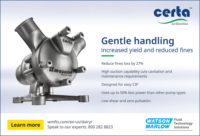Case Study
A E Rodda and Son invests in new pump from Watson-Marlow Fluid Technology Group
Energy efficiency prompts the creamery to acquire second MasoSine pump.

When A E Rodda and Son, a Cornwall, U.K.-based creamery, looked for a new depositing machine for its factory, the company’s previous success with a MasoSine pump from Watson-Marlow Fluid Technology Group (WMFTG) ensured it returned to the same source for a second unit. This time around, an energy-efficient Certa 100 was recommended to transfer a range of double- and single-cream products from mobile storage tanks to the hopper of the new depositing machine.
A E Rodda and Son has been making Cornish clotted cream since 1890, when Eliza Jane Rodda, great-great-grandmother of the current managing director, Nicholas Rodda, started making the cream in her farmhouse kitchen in the heart of Cornwall. 128 years later, the company still maintains many traditional methods of manufacturing. A E Rodda campaigned to get protected status for this Cornish delicacy, and in 1998, it was awarded Protected Designation of Origin status, along with the likes of Champagne and Parma ham.
The company is the largest Cornish clotted cream brand in the U.K. A E Rodda also exports its products around the world, with its famous clotted cream being served alongside cream teas on a number of airlines.
Previous success
In 2012, A E Rodda installed a MasoSine SPS 200 sine pump as part of a new clotted cream line, and its reliable performance has impressed the maintenance team.
“We were in the process of investing in a new depositing machine, which essentially deposits cream into a pot and seals it with a lid, so we needed to look for a suitable pump to transfer the product from mobile storage tanks,” explained A E Rodda’s maintenance supervisor, Paul Johnson. “Over the past six years of hard work we’ve had virtually no maintenance issues with the SPS 200; it has basically looked after itself. Importantly, the pump does not damage or compromise product integrity, which is crucial to our production process.”
This same approach was needed for the company’s new pouring cream production facility: low shear, low pulsation and gentle handling.
“Using a centrifugal pump, for example, would effectively churn the cream into something like butter,” Johnson said. “A sine pump was clearly the way forward, and we were keen on the new Certa from WMFTG, especially because of its energy-efficiency attributes.”
Unlike traditional pumps with rotors that cut through the fluid, Certa’s sinusoidal rotor gently carries product through the pump to dramatically reduce shear while cutting power consumption by up to 50% with high-viscosity fluids. Further advantages and high-performance levels delivered by sinusoidal technology include virtually no pulsation, simplicity, reliability, interchangeable parts and low cost of ownership.
Straightforward cleaning
Watson-Marlow’s technical team advised A E Rodda that the smallest pump in the Certa range, the Certa 100, would meet their requirements. This pump delivers the required flow rate of up 4,200 liters per hour.
In terms of the process, a mobile storage tank is wheeled up to the new depositing machine, where the Certa 100 transfers cream from one to the other. The pump is mounted low, facilitating a head of 2 meters into the machine’s hopper. No priming is required.
Offering European Hygienic Equipment Design Group (Type EL Class I and EL Aseptic Class I) and 3A certification as standard, Certa is extremely easy to clean for minimal downtime. Cleaner than any lobe or circumferential piston pump, a range of seven Certa pumps is available for flow rates up to 99,000 liters per hour and pressures to 15 bar.
“We’ve had the MasoSine Certa 100 for around 12 months, and there have been no issues whatsoever,” Johnson said. “Moreover, the pump is impressively quiet and is extremely energy-efficient. From experience, we have learned that it is three times more expensive to run a pneumatic pump than an electric pump.”
Looking for a reprint of this article?
From high-res PDFs to custom plaques, order your copy today!






